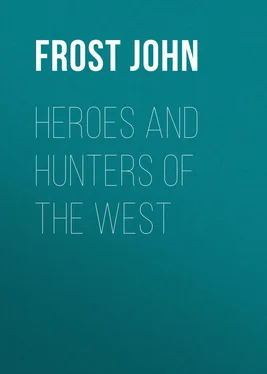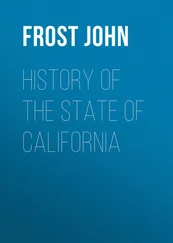John Frost - Heroes and Hunters of the West
Здесь есть возможность читать онлайн «John Frost - Heroes and Hunters of the West» — ознакомительный отрывок электронной книги совершенно бесплатно, а после прочтения отрывка купить полную версию. В некоторых случаях можно слушать аудио, скачать через торрент в формате fb2 и присутствует краткое содержание. Жанр: foreign_antique, foreign_prose, на английском языке. Описание произведения, (предисловие) а так же отзывы посетителей доступны на портале библиотеки ЛибКат.
- Название:Heroes and Hunters of the West
- Автор:
- Жанр:
- Год:неизвестен
- ISBN:нет данных
- Рейтинг книги:5 / 5. Голосов: 1
-
Избранное:Добавить в избранное
- Отзывы:
-
Ваша оценка:
- 100
- 1
- 2
- 3
- 4
- 5
Heroes and Hunters of the West: краткое содержание, описание и аннотация
Предлагаем к чтению аннотацию, описание, краткое содержание или предисловие (зависит от того, что написал сам автор книги «Heroes and Hunters of the West»). Если вы не нашли необходимую информацию о книге — напишите в комментариях, мы постараемся отыскать её.
Heroes and Hunters of the West — читать онлайн ознакомительный отрывок
Ниже представлен текст книги, разбитый по страницам. Система сохранения места последней прочитанной страницы, позволяет с удобством читать онлайн бесплатно книгу «Heroes and Hunters of the West», без необходимости каждый раз заново искать на чём Вы остановились. Поставьте закладку, и сможете в любой момент перейти на страницу, на которой закончили чтение.
Интервал:
Закладка:
Charles Johnston
In March, 1790 a boat, containing four men and two women, passing down the Ohio, was induced by some renegade whites to approach the shore, near the mouth of the Sciota, and then attacked by a large party of Indians. A Mr. John May and one of the women were shot dead, and the others then surrendered. The chief of the band was an old warrior, named Chickatommo, and under his command were a number of renowned red men. When the prisoners were distributed, a young man named Charles Johnson, was given to a young Shawnee chief who is represented to have been a noble character. His name was Messhawa, and he had just reached the age of manhood. His person was tall and seemingly rather fitted for action than strength. His bearing was stately, and his countenance expressive of a noble disposition. He possessed great influence among those of his own tribe, which he exerted on the side of humanity. On the march, Messhawa repeatedly saved Johnson from the tortures which the other savages delighted to inflict, and the young captive saw some displays of generous exertion on the part of the chief which are worthy of a place in border history.
The warriors painted themselves in the most frightful colors, and performed a war dance, with the usual accompaniments. A stake, painted in alternate stripes of black and vermilion, was fixed in the ground, and the dancers moved in rapid but measured evolutions around it. They recounted, with great energy, the wrongs they had received from the whites. – Their lands had been taken from them – their corn cut up – their villages burnt – their friends slaughtered – every injury which they had received was dwelt upon, until their passions had become inflamed beyond control. Suddenly, Chickatommo darted from the circle of dancers, and with eyes flashing fire, ran up to the spot where Johnston was sitting, calmly contemplating the spectacle before him. When within reach he struck him a furious blow with his fist, and was preparing to repeat it, when Johnston seized him by the arms, and hastily demanded the cause of such unprovoked violence. Chickatommo, grinding his teeth with rage, shouted “Sit down, sit down!” Johnston obeyed, and the Indian, perceiving the two children within ten steps of him, snatched up a tomahawk, and advanced upon them with a quick step, and a determined look. The terrified little creatures instantly arose from the log on which they were sitting, and fled into the woods, uttering the most piercing screams, while their pursuer rapidly gained upon them with uplifted tomahawk. The girl, being the youngest, was soon overtaken, and would have been tomahawked, had not Messhawa bounded like a deer to her relief. He arrived barely in time to arrest the uplifted tomahawk of Chickatommo, after which, he seized him by the collar and hurled him violently backward to the distance of several paces. Snatching up the child in his arms, he then ran after the brother, intending to secure him likewise from the fury of his companion, but the boy, misconstruing his intention, continued his flight with such rapidity, and doubled several times with such address, that the chase was prolonged to the distance of several hundred yards. At length Messhawa succeeded in taking him. The boy, thinking himself lost, uttered a wild cry, which was echoed by his sister, but both were instantly calmed. Messhawa took them in his arms, spoke to them kindly, and soon convinced them that they had nothing to fear from him. He quickly reappeared, leading them gently by the hand, and soothing them in the Indian language, until they both clung to him closely for protection.
No other incident disturbed the progress of the ceremonies, nor did Chickatommo appear to resent the violent interference of Messhawa.
After undergoing many hardships, Johnston was taken to Sandusky, where he was ransomed by a French trader. Messhawa took leave of his young captive with many expressions of esteem and friendship. This noble chief was in the battle of the Fallen Timber and afterwards became a devoted follower of the great Tecumseh – thus proving that while he was as humane as a civilized man, he was patriotic and high-spirited enough to resent the wrongs of his people. He was killed at the battle of the Thames, where the power of the Shawnees was for ever crushed.
Joseph Logston
Big Joe Logston was a noted character in the early history of the west. He was born and reared among the Alleghany mountains, near the source of the north branch of the Potomac, some twenty or thirty miles from any settlement. He was tall, muscular, excelled in all the athletic sports of the border, and was a first-rate shot. Soon after Joe arrived at years of discretion, his parents died, and he went out to the wilds of Kentucky. There, Indian incursions compelled him to take refuge in a fort. This pent up life was not at all to Joe’s taste. He soon became very restless, and every day insisted on going out with others to hunt up cattle. At length no one would accompany him, and he resolved to go out alone. He rode the greater part of the day without finding any cattle, and then concluded to return to the fort. As he was riding along, eating some grapes, with which he had filled his hat, he heard the reports of the two rifles; one ball passed through the paps of his breast, which were very prominent, and the other struck the horse behind the saddle, causing the beast to sink in its tracks.
Joe was on his feet in an instant and might have taken to his heels with the chances of escape greatly in his favor. But to him flight was never agreeable. The moment the guns were fired, an Indian sprang forward with an uplifted tomahawk; but as Joe raised his rifle, the savage jumped behind two saplings, and kept springing from one to the other to cover his body. The other Indian was soon discovered behind a tree loading his gun. When in the act of pushing down his bullet, he exposed his hips and Joe fired a load into him. The first Indian then sprang forward and threw his tomahawk at the head of the white warrior, who dodged it. Joe then clubbed his gun and made at the savage, thinking to knock him down. In striking, he missed, and the gun now reduced to the naked barrel, flew out of his hands. The two men then sprang at each other with no other weapons than those of nature. A desperate scuffle ensued. Joe could throw the Indian down, but could not hold him there. At length, however, by repeated heavy blows, he succeeded in keeping him down, and tried to choke him with the left hand while he kept the right free for contingencies. Directly, Joe saw the savage trying to draw a knife from its sheath, and waiting till it was about half way out, he grasped it quickly and sank it up to the handle in the breast of his foe, who groaned and expired.
Springing to his feet, Joe saw the Indian he had crippled, propped against a log, trying to raise his gun to fire, but falling forward, every time he made the attempt. The borderer, having enough of fighting for one day, and not caring to be killed by a crippled Indian, made for the fort, where he arrived about nightfall. He was blood and dirt from crown to toe, and without horse, hat, or gun.
The next morning a party went to Joe’s battle-ground. On looking round, they found a trail, as if something had been dragged away, and at a little distance they came upon the big Indian, covered up with leaves. About a hundred yards farther, they found the Indian Joe had crippled, lying on his back, with his own knife sticking up to the hilt in his body, just below the breast bone, evidently to show that he had killed himself. Some years after this fight, Big Joe Logston lost his life in a contest with a gang of outlaws. He was one of those characters who were necessary to the settlement of the west, but who would not have been highly esteemed in civilized society.
Читать дальшеИнтервал:
Закладка:
Похожие книги на «Heroes and Hunters of the West»
Представляем Вашему вниманию похожие книги на «Heroes and Hunters of the West» списком для выбора. Мы отобрали схожую по названию и смыслу литературу в надежде предоставить читателям больше вариантов отыскать новые, интересные, ещё непрочитанные произведения.
Обсуждение, отзывы о книге «Heroes and Hunters of the West» и просто собственные мнения читателей. Оставьте ваши комментарии, напишите, что Вы думаете о произведении, его смысле или главных героях. Укажите что конкретно понравилось, а что нет, и почему Вы так считаете.










![John Bruce - The Lettsomian Lectures on Diseases and Disorders of the Heart and Arteries in Middle and Advanced Life [1900-1901]](/books/749387/john-bruce-the-lettsomian-lectures-on-diseases-and-disorders-of-the-heart-and-arteries-in-middle-and-advanced-life-1900-1901-thumb.webp)
